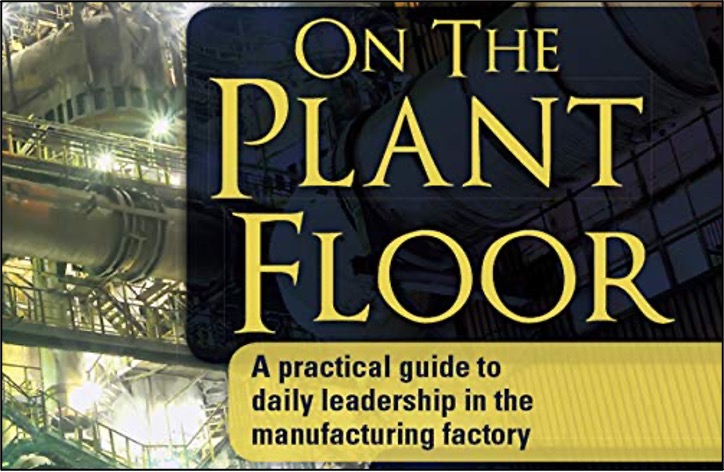Something to Say
Shortly after Bryan Geary and I left the corporate world to become entrepreneurs – the fancy term for starting our own company – we decided to write a book.
The motivation was simple: we each remembered how it felt when we started work on the plant floor.
It was like being thrown into the deep end of a pool to learn how to swim.
Now older and wiser, we were sure we had something to offer a new supervisor or freshly promoted plant manager that would help him or her in their role.
At the very least, we wanted to help them avoid the “deer in the headlights” expression we surely wore far too many times in our time as supervisors and plant managers.
The Challenge
How hard could it be to write a book on a subject we thought we knew backwards and forwards?
Between the two of us, we had over 50 years’ experience doing the things we planned to describe.
My father and sister each authored and published books, while my brother has had numerous papers published in scientific journals.
As it turned out, it was very hard.
First, we are two very different people with different writing styles.
Second, our viewpoints on leadership and certain plant functions and procedures can be very dissimilar, despite having worked closely together for more than 20 years and being good friends.
Third, we had never written anything more than corporate reports and presentations. Neither of us had led a secret life as a poet or ghostwriter.
Getting Started
Following a tradition observed by many famous authors, we met to kick things off over a few glasses of single malt whisky. That got the ideas flowing.
Eventually, we decided to focus on chapter titles defining the major topics we would cover.
Some of them came to us easily, being topics that everyone in a new role will face:
- Welcome to Management (we all have a first job)
- Dealing with Difficult People (sometimes you, sometimes me)
- Managing Upstream and Downstream (very much a learned skill, and certainly not immediately apparent to a new manager)
Others came from our shared experiences:
- Engagement (the importance of interactions with the workforce, commanding excellence, and setting standards of personal behavior)
- Building the Culture (regionalism in plant culture, attitudes toward work hours and working conditions, and how to influence a culture of improvement)
- Celebrate Victories Large and Small (the importance of recognition and how it affects the culture and operation of a factory)
- Disaster Strikes (how our team put a factory back together after a major tornado)
And some chapters were extremely personal:
- The Walk (Bryan’s personal approach to dealing with conflict and managing emotions)
- Not Everybody is Like You (the best advice I ever received, which came from my first boss)
Within a few sessions, the outline of our book was coming together.
The Process
We chose individual chapters to write and submitted drafts to each other for comments, additions, and editing.
This was actually the fun part as critiquing each other’s work taught us even more about each other than we already knew.
It was also fun because our original list of chapters quickly grew from 10 to the final 25!
The very act of writing made it evident that we needed to cover more material, including:
- Guarding Against Presumption
- Emails are Evil
- Cowboy Up (you’ll have to read a copy to find out what this one covers!)
Over a six-month period, we wrote, edited, complimented, and savaged each other as the chapters came together into the finished article.
In the end, we’re very proud of our work and producing it was cathartic, allowing us to get a lot of stuff off our chests.
Publication
I enlisted the help of my sister in submitting the book to appropriate publishing houses.
Many of them liked “On The Plant Floor” but they all thought its focus was too narrow for mass publication.
It became clear that, although we believed we had written a useful book, we weren’t going to see it in our local bookstore any time soon.
After a few months, we took the plunge into the world of self-publishing and before long it was available on Amazon.
Although we never dreamed it would become a best seller, we did hope it would reach a few people who would go on to benefit from our hard-earned experience.
As it turned out, almost 10 years after its publication, “On The Plant Floor” remains a best seller in the world of self-published non-fiction books.
Last year, cognizant of the trend from printed media to digital, we decided to produce an audio version, which was read by the excellent Andrew Scott.
The audiobook is available on Amazon Kindle and is also a best seller.
At least one Fortune 50 company is using our work as a training manual and more than one university is using it as a classroom text.
We humbly admit to being happily surprised at this level of popularity.
Most importantly, our experience with – and love for – manufacturing people and practices has been shared with people who can use it in their daily lives.
With luck, it will prevent them from repeating our mistakes and reinventing the wheel.
Will We Write Another Book?
Boris Pasternak published only one book, but it was “Dr Zhivago”
J.D. Salinger published only one book, but it was “Catcher in the Rye”
Since we are lightyears away from being in the same class as those authors, we think we might have another book in us – as well as a plan for updating “On The Plant Floor”.
Despite everything that we poured into the first one, we still have a few things to say and a lot to get off our chests!



